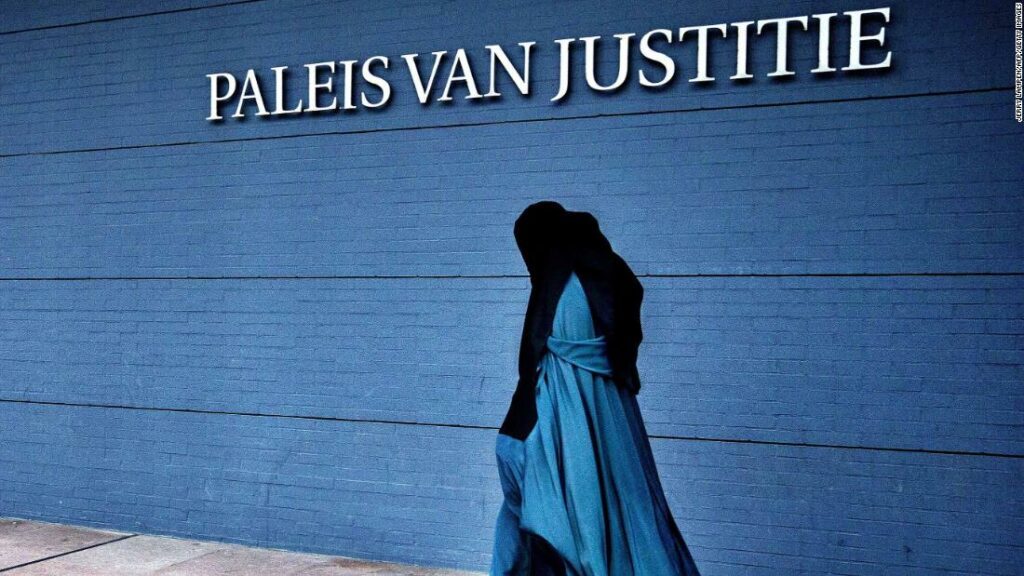(CNN) A “burqa ban” came into force in the Netherlands Thursday, but there are doubts over whether it will be applied in practice.
The legislation applies to all face-covering clothing on public transport and in schools, hospitals and government buildings, according to a police statement. However, it does not apply to public streets.
It covers the burqa and the niqab, as well as motor helmets and ski masks, with offenders subject to a 150 euro ($166) fine. But it does not include headscarves, as the face is still visible.
Police guidance says that staff at government institutions or on public transport are responsible for addressing those who flout the ban and requesting they remove the face covering, or leave the premises.
However spokespeople for the affected sectors have said they will not take responsibility.
Burqa, hijab, niqab: What’s what?
Do you know the difference between a hijab and a niqab? How about a burqa and a chador? Click through to read about the different types of headscarves some Muslim women wear.
Hijab: The scarf worn tightly around the head and neck does not cover the face. It is the most common Islamic head covering. This Indonesian girl is shopping for a hijab in Yogyakarta.
Burkini: The full-body swimsuit worn by Muslim women leaves only the face, hands and feet exposed. Here a woman in a burkini wades in the water with a child at Ghar El Melh beach in Tunisia.
Burqa: This full-body garment has a mesh over the eyes. The burqa is widely used in Afghanistan and was required under the Taliban. These Afghan women are shopping in Herat.
Niqab: The full-face veil exposes only the eyes. A Palestinian bride in Jericho wears this one.
Chador: The full-body black garment leaves the face exposed. These Iranian women are wearing chadors at a political meeting in Tehran.
Hospitals “should not be charged with this task, but it is up to the police and the judiciary,” the Dutch Federation of University Medical Centers told CNN affiliate NOS.
Representatives for the transport industry also said they will not enforce the ban, citing worries over disruption to services if police assistance is required, according to NOS.
Transport workers will not be able to hand out fines, instead stopping vehicles until police arrive.
However police say anyone who spots someone breaking the ban is authorized to make a citizen’s arrest.
Dutch MEP Samira Rafaela spoke out against the idea of citizen’s arrests on Twitter, raising fears over violence against women wearing the burqa as a result of the provision.
The law will be evaluated in three years, according to NOS, faster than the standard five-year assessment period for new legislation in the Netherlands.
A niqab is a head and face covering, which has an opening so the wearer’s eyes are visible. A burqa is similar, but also features a mesh covering over the eyes.
When the law passed in June 2018, Upper House press officer Gert Riphagen estimated there were between 200 and 400 burqa or niqab-wearing people in the Netherlands, out of a population of roughly 17 million.
Proponents of the law, including far-right Freedom Party politician Geert Wilders, say it will improve safety by making people more easily identifiable.
Critics warn it could dissuade some women from entering public spaces, including schools.
The law follows similar bans in France, Germany, Belgium, Switzerland and Denmark, some of which go further than the Dutch prohibition.
Denmark’s ban, which covers all public places, came into force on August 1 2018, sparking protests from hundreds of demonstrators.
By August 3 the first woman was fined 1,000 Danish kroner (about $155) for violating the ban.
France has had a ban in place since 2011, with fines of up to 150 euros ($172) for wearing the niqab or burqa in public places.
In October 2018 the United Nations Human Rights Committee said the ban violates the human rights of Muslim women and risks “confining them to their homes.”
The committee said two women fined for wearing the full-face Islamic veils should be compensated and called on France to review the ban.
Source link : https://amp.cnn.com/cnn/2019/08/01/europe/netherlands-burqa-ban-scli-intl
Author :
Publish date : 2019-08-01 07:00:00
Copyright for syndicated content belongs to the linked Source.
